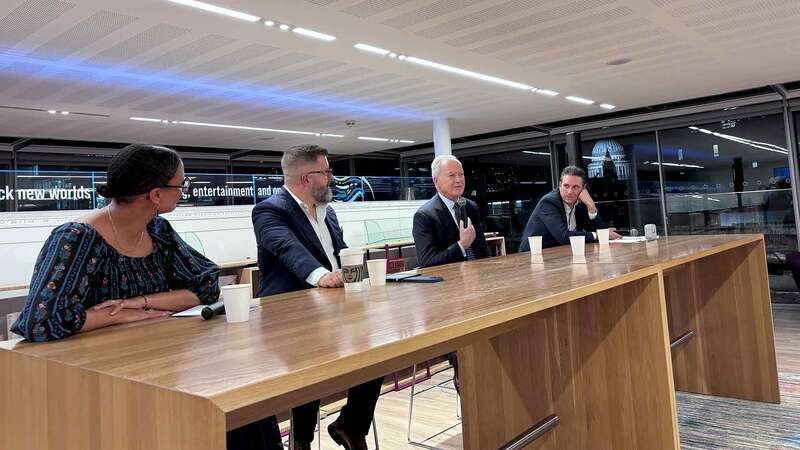You are viewing your 1 free article this month. Login to read more articles.
Brexit 'threat to business', say trade figures
As issues crystallised ahead of this week’s referendum on UK membership of the European Union, a majority of senior trade figures The Bookseller spoke to back “Remain”, saying economic uncertainty surrounding Brexit would be damaging to the UK. But those arguing the “Leave” case say such fears are exaggerated.
A victory for “Leave” is widely predicted to result in a swift drop in the value of the pound. If so, import costs would rise for publishers, while the economic uncertainty could cause consumer spending to shrink that would hit everyone, many say.
Bonnier Publishing c.e.o. Richard Johnson sounded a note of caution. “A ‘Brexit’ would be a financial disaster for UK publishing. I’m concerned more for the smaller publishers as we’re large enough to withstand a short-term collapse in the pound, but others won’t be. I believe the collapse would be temporary, so therefore we would just hold the line and have a short-term hit to our results,” he said.
Waterstones m.d. James Daunt warned that a retail recession could mean job losses within his chain, which was still “by no means secure in its financial position” despite recent improvements. “Waterstones has been through a pretty awful period of time in which we cut our shop workforce by roughly a third—the loss of any more would be devastating,” he commented.
Simon & Schuster UK c.e.o. Ian Chapman said he was also concerned about a fall in consumer spending, while Hachette UK c.e.o. Tim Hely Hutchinson predicted that a “Leave” win “is very likely to be bad for the economy, particularly...for schools, libraries and general consumers.”
Justin Adams, m.d. of Connect Books, speaking in a personal capacity, noted: “Uncertainty affects financial markets and that affects both levels of investment, the cost of debt, and the knock-on impact on the overall economy itself. We have already seen the impact on exchange rates and that volatility will continue, which makes the buying and selling of books internationally more complex and risky.”
Pan Macmillan m.d. Anthony Forbes Watson, also speaking in a personal capacity, predicted “long, drawn-out and toxic negotiations” for future trading with a post-Brexit EU.
“Why would the EU make it anything but agonising for us to leave, given the anxiety over others following suit?” he said.
While the UK battled to extract itself, “everything to do with frontiers would be more bureaucratic, expensive and regulated,” he foresaw, causing problems for distribution.
Adams thought that “hidden costs of exit” would arise, “as well as barriers to our attempts to win tenders and new business across Europe going forward—you can’t expect to reject our European partners and expect there to be no consequence on their buying patterns!”
But Biteback m.d. Iain Dale took a more buoyant view, saying: “It’s very easy to think of the negatives rather than the potential upsides. I can’t see why publishers are concerned at the falling pound—it would help exports. Long-term we can create our own trade agreements with anyone we like—Brussels has not been very good at that, and certainly not very speedy. And any hit to the economy would be very short-term.”
He also queried whether being stripped of the freedom of movement which exists within the EU would be a major issue for the industry, saying: “I don’t see the UK publishing sector employing a huge percentage of people from European universities, or a huge percentage going to work in Europe.”
Big issue
Both Profile m.d. Andrew Franklin and Curtis Brown’s Gordon Wise, president of the Association of Authors' Agents, warned about the future of exclusive European rights. Franklin said: “Europe is our single largest export market and a pivotal argument is that we must have exclusive European rights. Historically, British publishers have been able to say we must have European exclusivity because we are part of a single Europe.” But without that argument, there could be a move to make it an open market, he argued. Wise took the same view.
For academic publishing, veteran industry commentator Richard Fisher warned there would be “big issues around research funding and our share of the European research fund, particularly in terms of big science”, while he warned likely changes at the top of the Conservative leadership after a “Leave” win could mean a regime “more right-wing, more hostile to higher education than the current one”.
Independent Publishers Guild chief executive Bridget Shine said: “Publishers really value their links with their counterparts on the continent. The IPG ethos is that it is far better to talk with others around the table rather than pursue a policy of splendid isolation.”
Calling “Leave” arguments “bollocks and jingoistic”, Bloomsbury executive director Richard Charkin, speaking in a personal capacity, said: “Whatever difficulties we might have with our European colleagues, they are the good guys—they believe in the same things we believe in.”
Dale was a dissenting voice, saying: “We’re not coming out of Europe [just the EU], we still have all the cultural ties we had before. There’s no reason for any changes in cultural relations.”
Limited contingency plans have been made ahead of the vote. Blackwell’s c.e.o. David Prescott said: “We have already looked at the number of non-UK employees working for us, and measures like that, but it is hard to do any more planning until we know what the result is going to be on 24th June.”
Many industry leaders are making their views known to their employees, and encouraging them to vote. Curtis Brown is giving staff 90 minutes off work on referendum day for that purpose.
Perhaps Connect Books’ Adams summed up the predominant view best of all. “A Leave victory would create immediate challenges for the book industry, at an already fragile and challenging time, in return for questionable long-term benefits,” he said.
Remain or leave?
"The Leave camp will deny anything. It undermines a culture that believes in arguments and ideas with a rank and crude populism. It's an unheallthy atmosphere for culture and specifically for publishing which believes facts are sacred and ideas matter."
-Andrew Franklin, Profile m.d.
"Should we vote to leave, the immediate aftermath is likely to be chaotic. Former business secretary Vince Cable told our Annual Spring Conference a couple of months ago that it could take years to unravel ties with the EU, and that would cause headaches for UK businesses. We would hope that the UK government would act quickly to ensure that UK businesses can continue to trade well with Europe. A Brexit would also reopen the issue of Scottish independence and potentially trigger a second Referendum, with all the uncertainty that would bring."
-Bridget Shine, chief executive, Independent Publishers Guild
"My fundamental, instinctive objection to our membership of the EU is based on my dislike for the idea that we as a nation are gradually losing control over our own laws. For one example, the EU-directed increase in VAT has cost Silvertail and other publishers a great deal of money since it came in, and it will continue to do so."
-Humfrey Hunter, publisher, Silvertail Books
"Our universities thrive on the flow of students and researchers across Europe. 15,600 British students studied abroad in 2013-14 on the Erasmus student exchange programme; their future counterparts might well find such access more limited. 15% of academic staff at UK universities are from other EU countries; who knows what will happen to such a flow of intellect in a post-Brexit future? And that uncertainty extends into our own teams, too. I work alongside colleagues from several European countries, and I benefited hugely, earlier in my career, from spending several years working in publishing companies in Germany, Sweden and the Netherlands. What would be the barriers to such moves in the future?"
-Oliver Gadsby, c.e.o., Rowman & Littlefield International
"[In the event of a "Leave" victory,] aside from any impact on short term liquidity and FX rates, which we are working through in advance, the potential impacts that we would want to consider include how re-negotiations in the legislative landscape, such as data protection or copyright regulations, could affect us; and any disruption that a Brexit may cause to our supply chain and operations - although our current reliance on supply chain in the EU is limited."
-Pearson spokesperson
"This is clearly a very important decision for the country and we know many booksellers are engaged in the debate in their local communities."
-Rosamund de la Hey, president, Booksellers Association














